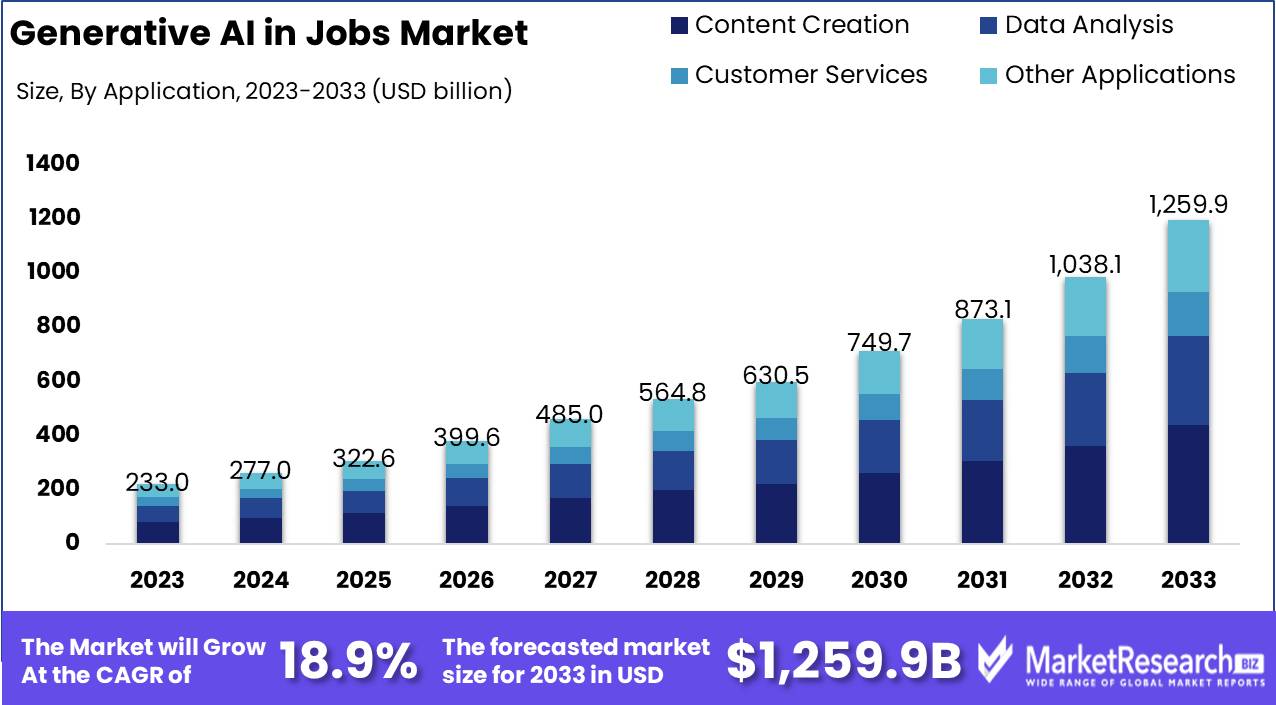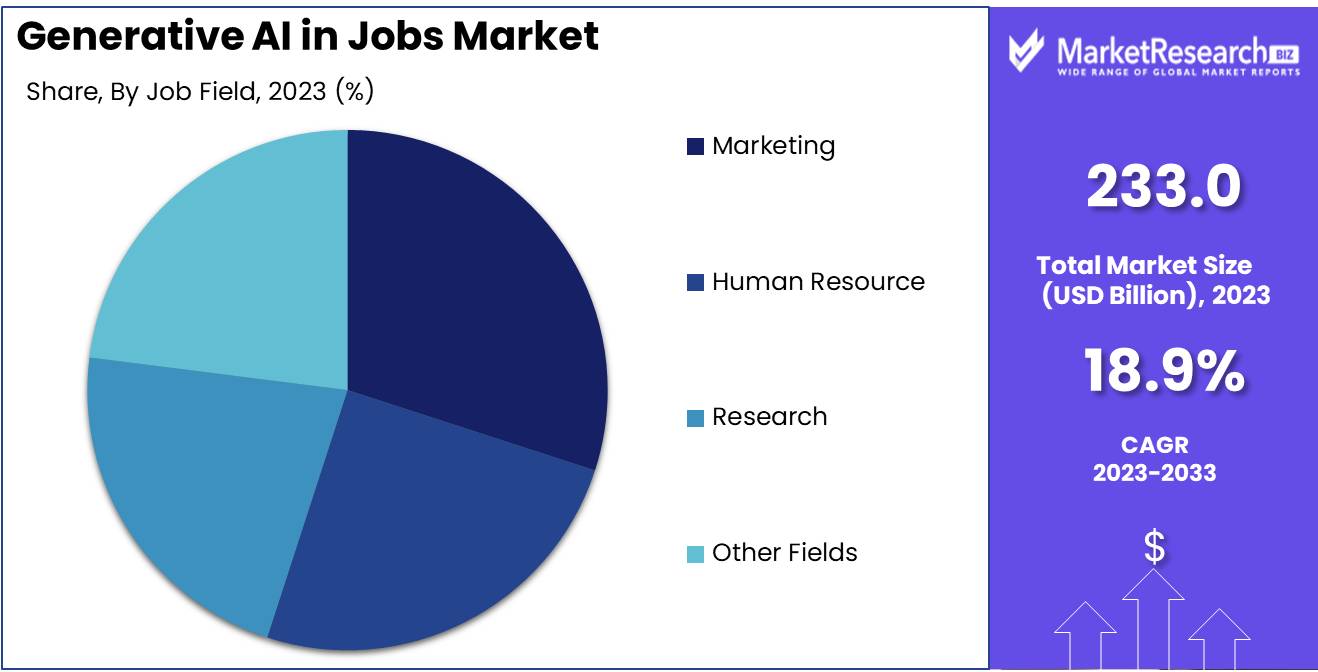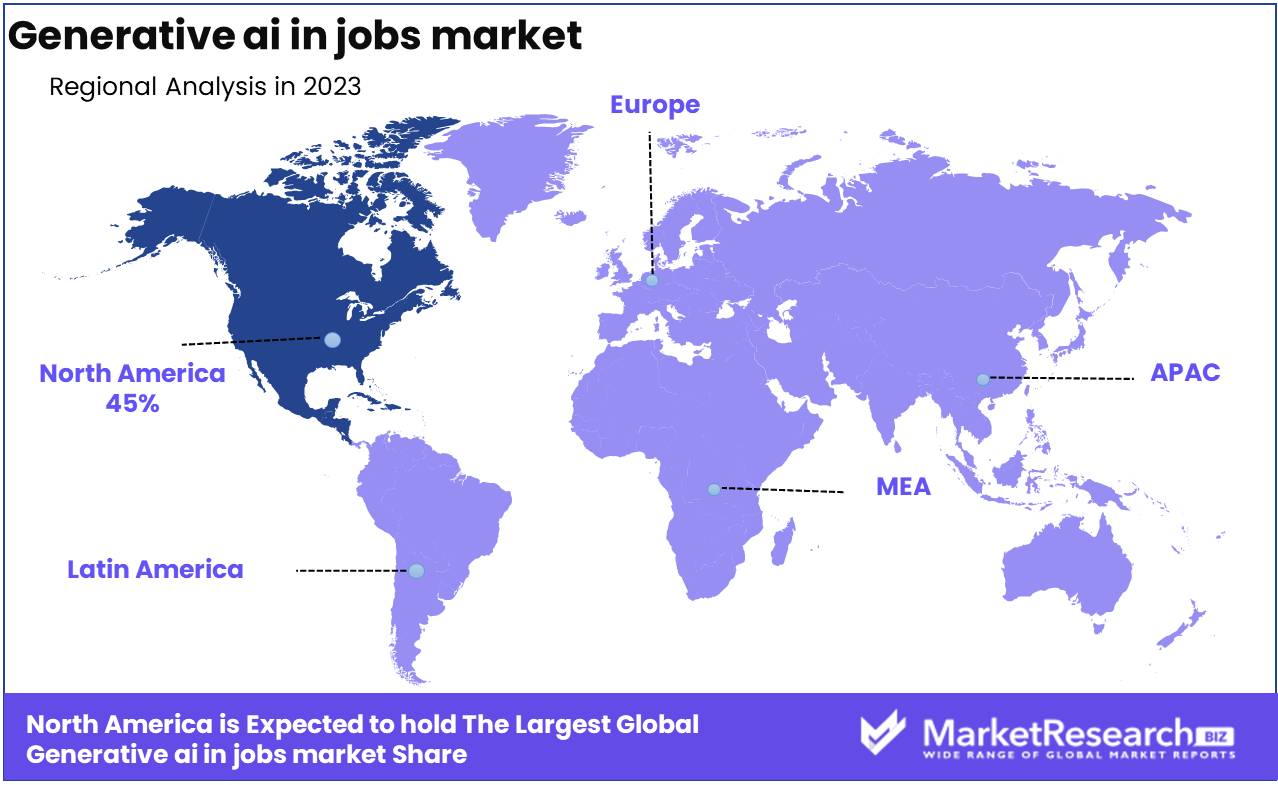
Generative AI in Jobs Market By Technology (Natural Language Processing, Computer Vision, Machine Learning, Other Technologies), By Application (Content Creation, Data Analysis, Customer Services, Other Applications), By Job Field (Marketing, Human Resource, Research, Other Fields), By Region and Companies - Industry Segment Outlook, Market Assessment, Competition Scenario, Trends and Forecast 2024-2033
-
49883
-
Aug 2024
-
136
-
-
This report was compiled by Vishwa Gaul Vishwa is an experienced market research and consulting professional with over 8 years of expertise in the ICT industry, contributing to over 700 reports across telecommunications, software, hardware, and digital solutions. Correspondence Team Lead- ICT Linkedin | Detailed Market research Methodology Our methodology involves a mix of primary research, including interviews with leading mental health experts, and secondary research from reputable medical journals and databases. View Detailed Methodology Page
-
Quick Navigation
Report Overview
The Global Generative AI in Jobs Market was valued at USD 233.0 Bn in 2023. It is expected to reach USD 1259.9 Mn by 2033, with a CAGR of 18.9% during the forecast period from 2024 to 2033.
The Generative AI in Jobs Market involves the application of generative artificial intelligence technologies to automate tasks, enhance productivity, and create new job roles across various industries. This market includes AI-driven tools and platforms that assist in tasks such as content creation, data analysis, customer service, and more. The increasing integration of generative AI into business operations is transforming job functions and driving the demand for new skills, significantly impacting workforce dynamics and employment patterns.

The Generative AI in Jobs Market is poised to revolutionize the employment landscape, driven by the rapid advancement and adoption of AI technologies. A recent analysis by Goldman Sachs suggests that generative AI could potentially automate up to 300 million full-time jobs in the U.S. and Europe, underscoring the profound impact this technology will have on the job market. This automation potential spans various sectors, from administrative roles to creative industries, fundamentally altering the nature of work.
Companies leveraging machine learning algorithms, such as Xero, exemplify the transformative effect of generative AI on business performance and customer satisfaction. Xero, a leader in cloud-based accounting software, reported NZD 1.23 billion in revenue, over 3 million subscribers, and a Net Promoter Score of 60 as of 2023. These metrics highlight the significant growth and efficiency gains achieved through the integration of AI technologies.
The market is characterized by a dual impact on employment. On one hand, generative AI will lead to job displacement in certain roles due to automation. On the other hand, it will create new opportunities by fostering the development of AI-centric roles and necessitating reskilling and upskilling of the workforce. This dynamic will drive the demand for AI literacy and proficiency across various job functions.
The integration of generative AI into business operations enhances productivity and innovation. AI-driven tools streamline processes, reduce operational costs, and enable personalized customer experiences, thereby increasing competitive advantage. Companies that effectively integrate AI technologies are likely to see significant improvements in efficiency and customer satisfaction.
Key Takeaways
- Market Value: The Global Generative AI in Jobs Market was valued at USD 233.0 Bn in 2023. It is expected to reach USD 1259.9 Mn by 2033, with a CAGR of 18.9% during the forecast period from 2024 to 2033.
- By Technology: Machine Learning dominates with 40%, essential for generating high-quality content.
- By Application: Content Creation constitutes 35%, enhancing productivity and creativity in various fields.
- By Job Field: Marketing utilizes 30%, leveraging AI for personalized and effective marketing strategies.
- Regional Dominance: North America holds a 45% market share, driven by innovation and high adoption of AI technologies.
- Growth Opportunity: Developing AI tools that offer real-time content optimization and personalized recommendations can significantly boost efficiency and engagement in marketing.
Driving factors
Increasing Need for Efficient Talent Matching and Recruitment
The increasing need for efficient talent matching and recruitment is a primary driving factor for the growth of the generative AI in jobs market. Traditional recruitment processes often involve significant time and resources, with recruiters sifting through numerous resumes to find suitable candidates. Generative AI streamlines this process by analyzing vast amounts of data to identify the best matches between job requirements and candidate profiles.
This technology can assess qualifications, experience, and even soft skills management with remarkable accuracy, reducing the time-to-hire and improving the overall quality of hires. As companies seek to optimize their recruitment processes, the demand for generative AI in talent acquisition is expected to rise, driving market growth.
Advancements in AI and Machine Learning Algorithms
Advancements in AI and machine learning algorithms significantly contribute to the expansion of the generative AI in jobs market. Continuous improvements in these technologies enable more sophisticated data analysis, pattern recognition, and predictive modeling. Generative AI leverages these advancements to generate insights from complex datasets, enhancing its capability to predict job market trends, recommend career paths, and identify skill gaps.
The integration of natural language processing (NLP) allows AI systems to understand and interpret human language, further refining the matching process between job seekers and employers. As AI and machine learning technologies evolve, their application in the jobs market becomes more effective and widespread, propelling market growth.
Growth in Remote and Gig Economy Jobs
The growth in remote and gig economy jobs is another crucial factor driving the generative AI in jobs market. The COVID-19 pandemic accelerated the shift towards remote work and the gig economy, creating a more dynamic and flexible job market. Generative AI helps bridge the gap between employers and a dispersed workforce by providing tools for virtual recruitment, remote onboarding, and performance monitoring.
AI-driven platforms can match freelancers and remote workers with suitable projects based on their skills and availability, facilitating efficient talent utilization. The increasing prevalence of remote and gig economy jobs necessitates advanced AI solutions to manage and optimize this evolving employment landscape, boosting the demand for generative AI technologies.
Restraining Factors
Concerns Over Bias and Fairness in AI Algorithms
One of the primary restraining factors for the generative AI in jobs market is the concern over bias and fairness in AI algorithms. Despite the advanced capabilities of AI, there is a risk that these systems can inadvertently perpetuate existing biases present in historical data. Biases in AI can lead to unfair hiring practices, where certain groups may be favored or discriminated against based on gender, race, age, or other attributes.
This issue has garnered significant attention from both regulators and the public, prompting calls for greater transparency and accountability in AI systems. To address these concerns, companies must invest in developing and implementing robust bias mitigation strategies, which can be costly and complex, potentially hindering the widespread adoption of generative AI in recruitment processes.
Data Privacy and Security Issues
Data privacy and security issues also pose significant challenges to the growth of the generative AI in jobs market. The effective functioning of AI algorithms relies on the collection and analysis of vast amounts of personal data, including resumes, employment histories, and other sensitive information. Ensuring the protection of this data is paramount, as breaches can lead to severe consequences for both job seekers and employers. Stringent data protection regulations, such as the General Data Protection Regulation (GDPR) in Europe, impose strict requirements on how personal data is collected, stored, and used.
Compliance with these regulations requires substantial resources and robust security measures, which can deter smaller companies from adopting generative AI solutions. Additionally, public concerns about data privacy may reduce the willingness of individuals to share their information with AI-driven recruitment platforms, further restraining market growth.
By Technology Analysis
Machine Learning held a dominant market position in the By Technology segment of the Generative AI in Jobs Market, capturing 40% share.
In 2023, Machine Learning held a dominant market position in the By Technology segment of the Generative AI in Jobs Market, capturing 40% share. Machine learning's dominance is driven by its extensive applications in automating complex tasks, optimizing decision-making processes, and enhancing predictive analytics. In the job market, machine learning algorithms are widely used for resume screening, candidate matching, and predicting job market trends.
Natural Language Processing (NLP) also plays a crucial role, enabling the development of advanced chatbots, virtual assistants, and sentiment analysis tools that improve communication and customer service in the job market. Despite its importance, NLP holds a smaller market share compared to machine learning due to its more specific applications.
Computer Vision is used for automating visual tasks such as identity verification and workplace safety monitoring. While significant, its market share is modest compared to machine learning, reflecting its niche applications in the job market.
Other Technologies, including reinforcement learning and generative adversarial networks (GANs), are utilized for specialized tasks but collectively hold a smaller market share due to their specific and emerging nature in the job market context.
By Application Analysis
Content Creation held a dominant market position in the By Application segment of the Generative AI in Jobs Market, capturing 35% share.
In 2023, Content Creation held a dominant market position in the By Application segment of the Generative AI in Jobs Market, capturing 35% share. The use of generative AI in content creation streamlines the production of job postings, marketing materials, and company communications. AI tools are leveraged to generate high-quality, engaging content quickly and efficiently, reducing the workload on human writers and designers.
Data Analysis is another key application, where AI tools are used to analyze large datasets, identify trends, and provide actionable insights. This application supports strategic decision-making in recruitment and generative ai in workforce management but holds a smaller market share compared to content creation due to its more specialized focus.
Customer Services benefit from AI-driven chatbots and virtual digital assistant that handle candidate inquiries, schedule interviews, and provide support throughout the hiring process. Although important, the market share for customer services applications is smaller relative to content creation due to the auxiliary nature of these functions.
Other Applications include employee training, performance management, and career development, which utilize generative AI to enhance various aspects of workforce management.
By Job Field Analysis
Marketing held a dominant market position in the By Job Field segment of the Generative AI in Jobs Market, capturing 30% share.
In 2023, Marketing held a dominant market position in the By Job Field segment of the Generative AI in Jobs Market, capturing 30% share. The marketing field extensively uses generative AI to create personalized campaigns, generate content, and optimize advertising strategies. AI-driven tools help marketers analyze consumer data, predict trends, and tailor messages to specific audiences, enhancing the effectiveness of marketing efforts.
Human Resource (HR) also represents a significant field, utilizing generative AI for recruitment, employee engagement, and talent management. AI tools streamline HR processes, improve candidate matching, and enhance employee experiences.
Research benefits from AI in data collection, analysis, and the generation of reports and insights. AI tools enhance the efficiency and accuracy of research activities across various industries.
Other Fields, including finance, healthcare, and education, also leverage generative AI for various tasks such as financial forecasting, patient data analysis, and personalized learning. These fields collectively hold a smaller market share compared to the dominant sectors of marketing, HR, and research due to their niche and specific use cases.

Key Market Segments
By Technology
- Natural Language Processing
- Computer Vision
- Machine Learning
- Other Technologies
By Application
- Content Creation
- Data Analysis
- Customer Services
- Other Applications
By Job Field
- Marketing
- Human Resource
- Research
- Other Fields
Growth Opportunity
Development of AI-Driven Career Development and Training Tools
The development of AI-driven career development and training tools represents a significant growth opportunity for the generative AI in jobs market in 2024. These tools can analyze individual career paths, identify skill gaps, and recommend personalized training programs to enhance employability. By leveraging AI, these platforms can provide real-time feedback and adaptive learning experiences, tailored to the needs of each user.
This capability not only benefits job seekers but also helps employers develop their existing workforce, ensuring they remain competitive in a rapidly evolving job market. The growing emphasis on continuous learning and professional development aligns perfectly with the capabilities of AI-driven tools, fostering market growth.
Expansion in Automated Job Matching and Candidate Screening
The expansion of automated job matching and candidate screening is another key opportunity for the generative AI in jobs market. AI algorithms can quickly and accurately match candidates to job openings based on a comprehensive analysis of their skills, experience, and preferences. This automation reduces the time and effort required for both job seekers and employers, enhancing the efficiency of the recruitment process.
AI-driven screening tools can assess candidate suitability through various metrics, including behavioral and cognitive assessments, ensuring a better fit for organizational culture and job requirements. As companies seek to streamline their hiring processes and improve the quality of their hires, the adoption of automated job matching and screening solutions is expected to increase, driving market growth.
Latest Trends
Creating Personalized Job Recommendations
A major trend in the generative AI in jobs market for 2024 is the creation of personalized job recommendations. Leveraging advanced AI algorithms, platforms can analyze a candidate’s skills, experiences, preferences, and career goals to suggest the most suitable job opportunities. This personalization enhances the job search experience, making it more efficient and tailored to individual needs.
By providing highly relevant job matches, AI-driven platforms can improve candidate satisfaction and increase the likelihood of successful placements. This trend not only benefits job seekers but also employers, who can attract candidates that are well-matched to their roles and organizational culture.
Integration with HR Platforms
Integration with HR platforms is another significant trend driving the generative AI in jobs market. As companies seek to streamline their HR processes, the seamless integration of AI tools with existing HR systems becomes increasingly important. This integration allows for the automation of various HR functions, such as recruitment, onboarding, performance management, and employee engagement.
By embedding AI into HR platforms, organizations can leverage data-driven insights to make more informed decisions, improve operational efficiency, and enhance the overall employee experience. The growing demand for integrated HR solutions is expected to drive the adoption of generative AI technologies in the jobs market.
Regional Analysis
In 2023, the North America region held a dominant market position in the Generative AI in Jobs Market, capturing more than a 45% share.
The North America region held a dominant market position in the Generative AI in Jobs Market, capturing more than a 45% share. The region's leadership is driven by the rapid adoption of AI technologies across various industries, particularly in the U.S. Companies leverage generative AI for recruitment, talent management, and job matching, significantly enhancing efficiency and accuracy in the job market.
Europe is another key player, with countries like Germany, the UK, and France adopting AI for workforce management and recruitment processes. The region's focus on innovation and technological advancement supports the growth of generative AI applications in the job market.
The Asia-Pacific region is also growing, with substantial investments in AI technology. Countries like China, Japan, and India are increasingly using generative AI for various job market applications, driven by large workforces and a focus on technological integration.
In the Middle East & Africa, the market is emerging with growing awareness and adoption of AI in the job market. The adoption is slower compared to other regions but shows potential with increasing investments in technology and education.
Latin America is steadily adopting generative AI in the job market, with countries like Brazil and Mexico leading the way. The region's focus on improving employment processes and technological adoption supports market growth.

Key Regions and Countries
North America
- US
- Canada
- Mexico
Western Europe
- Germany
- France
- The UK
- Spain
- Italy
- Portugal
- Ireland
- Austria
- Switzerland
- Benelux
- Nordic
- Rest of Western Europe
Eastern Europe
- Russia
- Poland
- The Czech Republic
- Greece
- Rest of Eastern Europe
APAC
- China
- Japan
- South Korea
- India
- Australia & New Zealand
- Indonesia
- Malaysia
- Philippines
- Singapore
- Thailand
- Vietnam
- Rest of APAC
Latin America
- Brazil
- Colombia
- Chile
- Argentina
- Costa Rica
- Rest of Latin America
Middle East & Africa
- Algeria
- Egypt
- Israel
- Kuwait
- Nigeria
- Saudi Arabia
- South Africa
- Turkey
- United Arab Emirates
- Rest of MEA
Key Players Analysis
Google and Microsoft Corporation are at the forefront of the generative AI in jobs market, leveraging their vast resources and cutting-edge technologies to revolutionize job search and recruitment processes. NVIDIA provides the essential hardware and software infrastructure that powers advanced AI applications, enabling other companies to innovate rapidly.
Adobe Inc. and IBM Corporation focus on integrating generative AI into creative and enterprise solutions, respectively, enhancing productivity and job efficiency. Salesforce utilizes AI to improve customer relationship management, offering tools that streamline job functions and enhance performance. OpenAI is a pioneer in AI research and development, providing foundational models and tools that other companies build upon.
Tesla applies generative AI to optimize manufacturing and logistics, demonstrating the technology's versatility across industries. These key players drive the market by developing AI solutions that transform job functions, improve efficiency, and create new opportunities. Continuous innovation, strategic partnerships, and a commitment to advancing AI technology position these companies as leaders in the generative AI in jobs market.
Market Key Players
- Microsoft Corporation
- NVIDIA
- Adobe Inc.
- IBM Corporation
- Salesforce
- OpenAI
- Tesla
- Other Key Players
Recent Development
- In May 2024, Adobe Inc. launched a new AI-driven platform that helps companies create engaging job advertisements. This platform aims to increase applicant engagement by 25%.
- In March 2024, Microsoft Corporation invested $50 million in developing generative AI solutions for HR analytics. This investment aims to streamline recruitment processes and enhance talent management.
Report Scope
Report Features Description Market Value (2023) USD 233.0 Bn Forecast Revenue (2033) USD 1259.9 Mn CAGR (2024-2033) 18.9% Base Year for Estimation 2023 Historic Period 2018-2023 Forecast Period 2024-2033 Report Coverage Revenue Forecast, Market Dynamics, Competitive Landscape, Recent Developments Segments Covered By Technology (Natural Language Processing, Computer Vision, Machine Learning, Other Technologies), By Application (Content Creation, Data Analysis, Customer Services, Other Applications), By Job Field (Marketing, Human Resource, Research, Other Fields) Regional Analysis North America - The US, Canada, & Mexico; Western Europe - Germany, France, The UK, Spain, Italy, Portugal, Ireland, Austria, Switzerland, Benelux, Nordic, & Rest of Western Europe; Eastern Europe - Russia, Poland, The Czech Republic, Greece, & Rest of Eastern Europe; APAC - China, Japan, South Korea, India, Australia & New Zealand, Indonesia, Malaysia, Philippines, Singapore, Thailand, Vietnam, & Rest of APAC; Latin America - Brazil, Colombia, Chile, Argentina, Costa Rica, & Rest of Latin America; Middle East & Africa - Algeria, Egypt, Israel, Kuwait, Nigeria, Saudi Arabia, South Africa, Turkey, United Arab Emirates, & Rest of MEA Competitive Landscape Google, Microsoft Corporation, NVIDIA, Adobe Inc., IBM Corporation, Salesforce, OpenAI, Tesla, Other Key Players Customization Scope Customization for segments, region/country-level will be provided. Moreover, additional customization can be done based on the requirements. Purchase Options We have three licenses to opt for: Single User License, Multi-User License (Up to 5 Users), Corporate Use License (Unlimited User and Printable PDF) -
-
- Microsoft Corporation
- NVIDIA
- Adobe Inc.
- IBM Corporation
- Salesforce
- OpenAI
- Tesla
- Other Key Players




